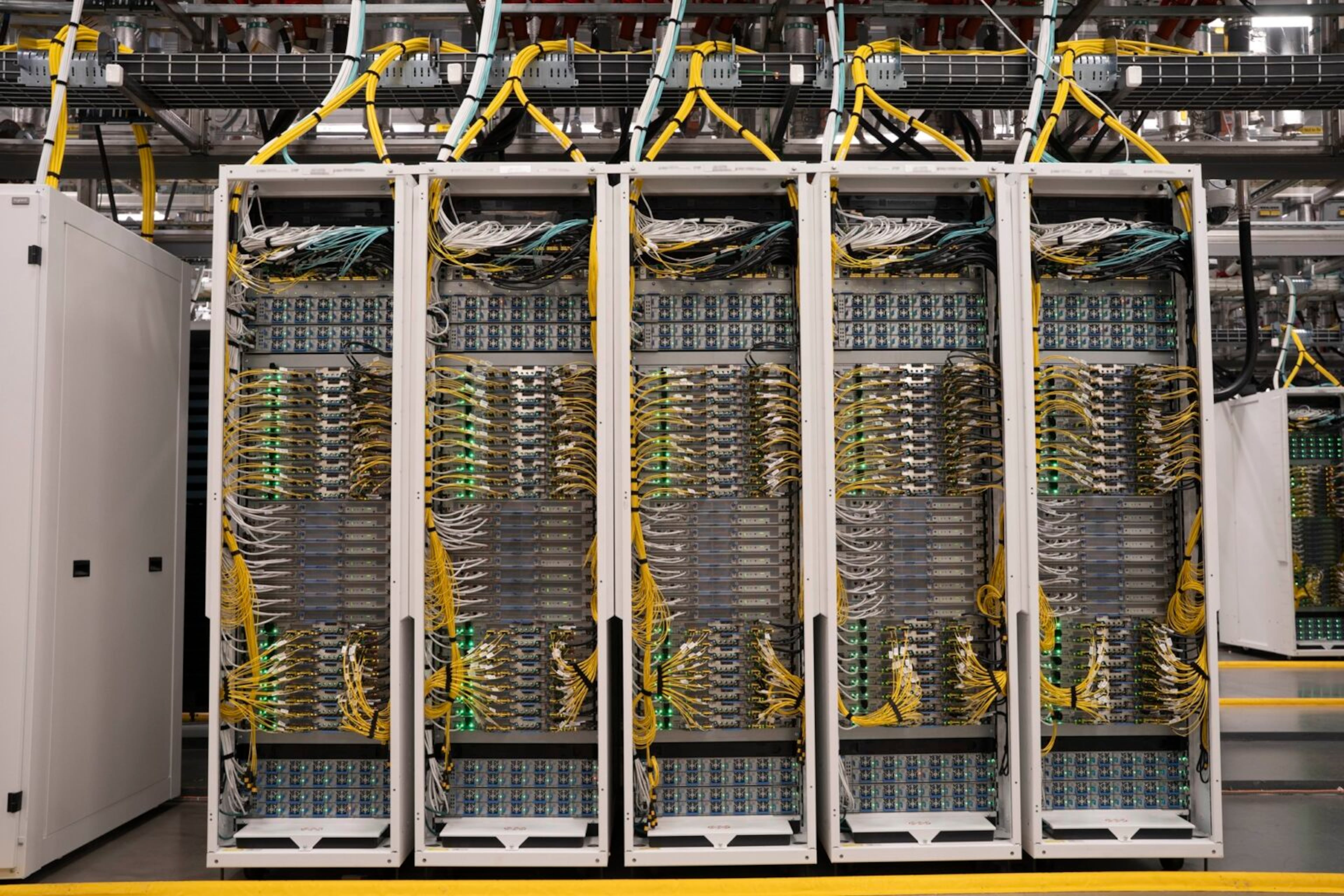Microsoft’s newest AI ‘superfactory’ opens at sprawling Fayetteville campus

One of the largest data center campuses under construction in Georgia has its first operational tenant, and it’s one of the most recognizable names in technology.
Microsoft recently unveiled a new data center near Atlanta that is part of its first artificial intelligence “superfactory,” an effort the company calls Fairwater.
The facility began operations in October, spans more than 1 million square feet and directly connects to a Fairwater center in Wisconsin, where the company intends to train the next generation of AI models.
A company spokesperson told The Atlanta Journal-Constitution the facility is located in Fayetteville but declined to provide a specific location. Records obtained by the AJC through an open records request reveal the only suitable site permitted for data center occupancy in Fayetteville is within a 615-acre campus developed by QTS — one of the largest such projects under construction in the state.
A spokesperson for QTS, a subsidiary of private equity giant Blackstone, said the company does not disclose customers. The Fayette County Development Authority, which helped recruit the multi-billion dollar QTS project to Fayetteville, declined to comment.
The scale and connectivity of Microsoft’s Fairwater effort is unprecedented for the Redmond, Washington-based company, which is vying with other tech giants to win the AI arms race. Mark Russinovich, chief technical officer and technical fellow for Microsoft Azure, the company’s cloud computing platform, said data center infrastructure like that in the new metro Atlanta facility is only the beginning.

“To make improvements in the capabilities of the AI, you need to have larger and larger infrastructure to train it,” Russinovich said in a news release. “The amount of infrastructure required now to train these models is not just one data center, not two, but multiples of that.”
The QTS project along Georgia Highway 54 in Fayetteville was first unveiled in August 2022 under the code name “Project Excalibur.” QTS bought the 615 acres of rural land for $154 million and planned billions of dollars of investment, envisioning up to 7 million square feet of data centers.
That’s the floor space of about four-and-a-half Lenox Square malls.
QTS, which also operates one of the Southeast’s largest data center campuses near the Fulton County Jail in Atlanta, leases its computer storage space to a variety of companies. Security at QTS data centers, and all similar facilities, is paramount and typically features gates, on-site security forces and several biometric scans to access server floors.
Fayetteville issued a certificate of occupancy for the first building within the QTS campus in May, and a subsequent construction completion certificate was issued Sept. 25, according to the documents obtained by the AJC. They are the only such certificates issued in the city in the past five years.
Outside of Fayetteville, only one other large data center campus has been proposed in the county: Project Rita near Tyrone.
Niki Vanderslice, president and CEO of the Fayette County Development Authority, told the AJC in July that it will likely take years before another similar project joins those two.
“As of right now, we don’t have any sites that would be conducive to an additional data center,” she said. “It’s not a pause, but we would like for the community to realize the benefits before we move forward on any more.”

Microsoft, meanwhile, has found ample room to grow its data center operations on Atlanta’s Southside.
The company is developing a 2.1 million-square-foot data center in Union City that is being built by EdgeConnex. Microsoft has also paid at least $171 million to acquire more than 480 acres across Atlanta’s Southside for data center development, adding to a rush of computer server storage facilities that are being built across the region.
The data center development boom has thrust the Atlanta area into the upper echelon of computer server storage markets, second to only Northern Virginia, according to data from real estate services firm CBRE. The fast-growing sector has sparked controversy over its electricity and water usage, prompting pushback and protest from neighborhood groups and environmentalists — including in Fayette County.
Data Surge: An AJC series
Data center development is surging in Georgia with metro Atlanta becoming the fastest growing market for server farms in the U.S. and one of the top locations in the world. But the data center boom has raised many questions about land use, the resources the complexes consume and the risk of costs being spread to other Georgia residents and businesses. The Atlanta Journal-Constitution “Data Surge” takes an in-depth look into the power and water demands of data centers and the deliberations of policymakers about this rising industry.
Part 1: Why mall-sized data centers are popping up across Georgia
Part 2: Data centers become new flashpoint for local controversy in Georgia
Part 3: Data Center Alley has lessons to teach. Is metro Atlanta listening?
Part 4: As data centers flock to Georgia, state lawmakers haven’t pumped the brakes
Part 5: Data centers’ thirst for power and water places Georgia on edge
Part 6: Why Big Tech sees Georgia farmland as ripe for data centers
Part 7: What data center companies are spending for Georgia land might shock you
Part 8: Data centers promise tax gains for Georgia. But are they delivering?
Microsoft said its Fairwater facility uses an improved closed-loop cooling system that “consumes almost zero water in its operation.” Alistair Speirs, a Microsoft general manager, said the facility’s connectivity is unique and needed to fulfill its AI training needs.
“A traditional data center is designed to run millions of separate applications for multiple customers,” Speirs said in the release. “The reason we call this an AI superfactory is it’s running one complex job across millions of pieces of hardware. And it’s not just a single site training an AI model, it’s a network of sites supporting that one job.”



